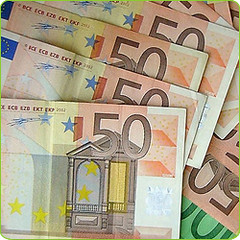Why Greece and Ireland won't ditch the euro
The American economist Paul Krugman has written an article about the EU and the euro, which in many ways is informative and useful.
However, towards the end he discusses “four ways the European crisis could play out (and it may play out differently in different countries). Call them toughing it out; debt restructuring; full Argentina; and revived Europeanism.” I don’t have any issues with these apart from the third one, Full Argentina. This is his name for reintroducing a national currency and devaluing it:
To do so, they would have to overcome a big obstacle: the fact that, unlike Iceland, they no longer have their own currencies. As Barry Eichengreen of Berkeley pointed out in an influential 2007 analysis, any euro-zone country that even hinted at leaving the currency would trigger a devastating run on its banks, as depositors rushed to move their funds to safer locales. And Eichengreen concluded that this “procedural” obstacle to exit made the euro irreversible.
But Argentina’s peg to the dollar was also supposed to be irreversible, and for much the same reason. What made devaluation possible, in the end, was the fact that there was a run on the banks despite the government’s insistence that one peso would always be worth one dollar. This run forced the Argentine government to limit withdrawals, and once these limits were in place, it was possible to change the peso’s value without setting off a second run. Nothing like that has happened in Europe — yet. But it’s certainly within the realm of possibility, especially as the pain of austerity and internal devaluation drags on.
The big difference between Argentina’s dollar peg and a Eurozone country like Greece is that there is no Greek currency any more. Some English-speaking commentators seem to think that there are Greek (and German etc.) Euro notes, and that bank accounts are in Greek (or German etc.) Euros, more or less as the situation was under the ERM/ECU system.
However, this is not the case. Euro notes are the same throughout the Eurozone (the serial number shows where each note originated, but all notes are legal tender everywhere), and debt and savings are in Euros, not in national currencies.
As Willem Buiter once wrote: “There are no German euro notes and Italian euro notes. There are just euro notes. There are no Greek euros, Irish euros, Italian euros and German euros. There are just euros. Easy, isn’t it?”
Imagine a country (for argument’s sake, Greece) wanted to leave the euro. What would happen? (Based partly on this article.)
As soon as people found out that the option was being seriously discussed, they would assume that the new Greek currency would be devalued vis-à-vis the euro, and savers and investors would rush to move their investments into ‘safe’ euros, i.e., either physical euro notes, or euro accounts outwith Greece; at the same time, borrowers from all over the world would try to move into Greek euros, taking out loans with Greek banks. The overall effect would be to trigger huge transfers of deposits out of the country and wreck the banking system.
Then there would be the problem of creating new drachma notes and coins, which could take years, and in the meantime the euro would still be used.
So basically one would be looking at several years’ of capital flight, followed by a huge devaluation, and probably endless legal fights about which the currency of cross-border contracts (if I had signed a contract with a Greek customer today about delivery in three years’ time, I’d expect to be paid in real euros, not new drachmas).
So I really can’t see that any country would possibly want to go through hell like this, no matter what American Nobel prize winners say. It’d probably be easier for a Eurozone country with a sound economy (e.g., Germany) to reestablish a national currency, but that wasn’t what Krugman was discussing in his article.

I agree. Switching to the Euro is a one-way street except for strong and stable economies. In principle Germany could do it, but they are gaining so much from being able to trade so freely that there’s little point to it. Though if the Euro got seriously weakened, it could be a way for a country to save itself – but pretty much by sacrificing all the other Euro-countries.
Indeed, and German governments tend to have a strong European mindset, so I just can’t see it happening.